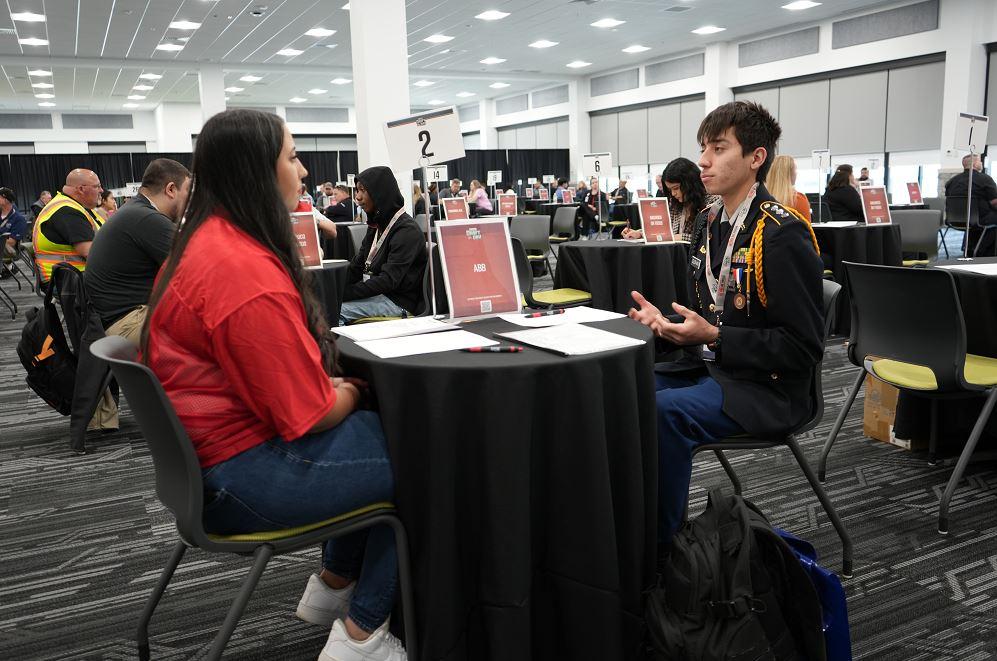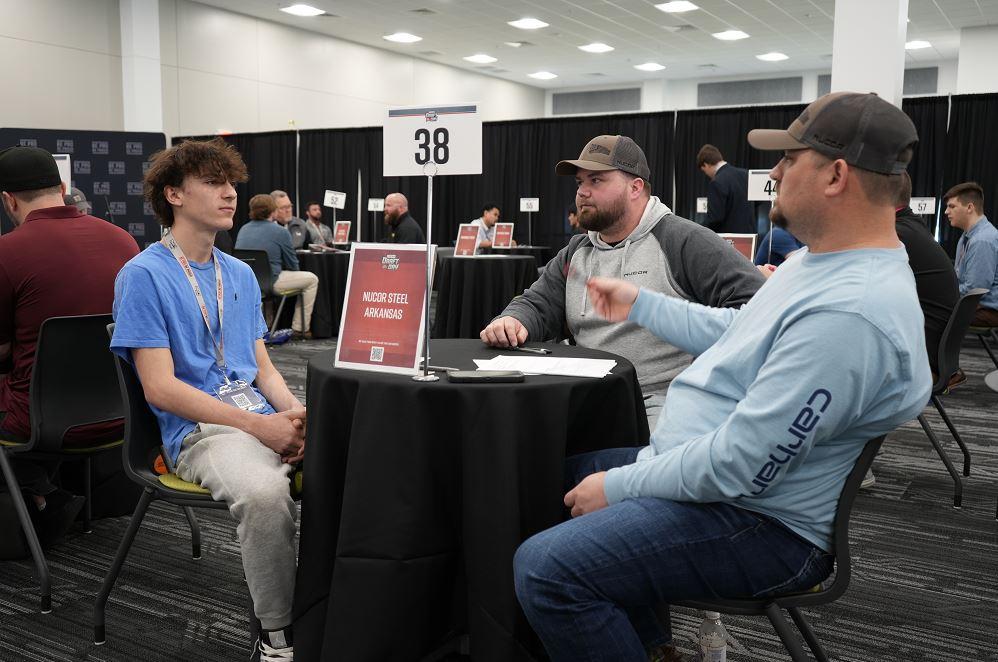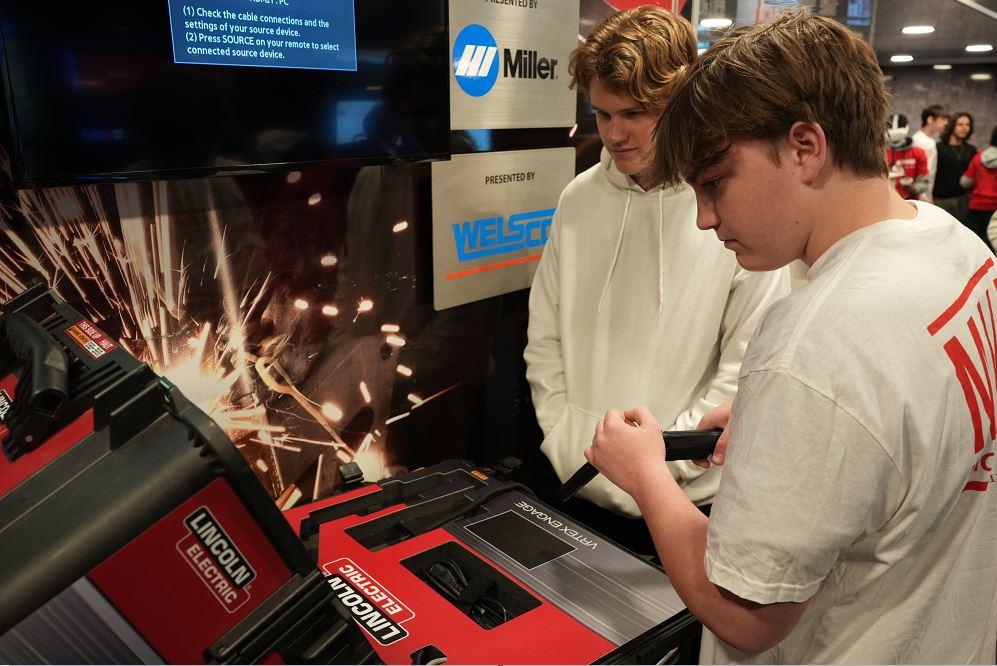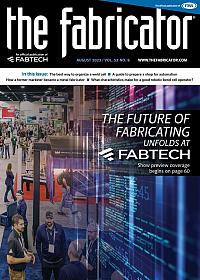Editor
- FMA
- The Fabricator
- FABTECH
- Canadian Metalworking
Categories
- Additive Manufacturing
- Aluminum Welding
- Arc Welding
- Assembly and Joining
- Automation and Robotics
- Bending and Forming
- Consumables
- Cutting and Weld Prep
- Electric Vehicles
- En Español
- Finishing
- Hydroforming
- Laser Cutting
- Laser Welding
- Machining
- Manufacturing Software
- Materials Handling
- Metals/Materials
- Oxyfuel Cutting
- Plasma Cutting
- Power Tools
- Punching and Other Holemaking
- Roll Forming
- Safety
- Sawing
- Shearing
- Shop Management
- Testing and Measuring
- Tube and Pipe Fabrication
- Tube and Pipe Production
- Waterjet Cutting
Industry Directory
Webcasts
Podcasts
FAB 40
Advertise
Subscribe
Account Login
Search
Be Pro Be Proud aims to change perception of trades with Draft Day
Q&A with executive director Andrew Parker and Be Pro Be Proud’s workforce development initiative
- By Rafael Guerrero
- August 22, 2023
- Article
- Shop Management

Be Pro Be Proud is a workforce development initiative with the main objectives of introducing potential skills careers to students and changing their perceptions of skilled professions. The initiative started in Arkansas in 2016; it has since expanded to other states. Images: Be Pro Be Proud
The term “Draft Day” conjures up mental images of football or basketball prospects waiting to be called up by a team—their soon-to-be employer.
In a way, the workforce initiative Be Pro Be Proud is doing the same thing for high school students participating in its Draft Day events. If they interview well enough, these students will have employers calling to offer them a job.
Be Pro Be Proud aims to introduce potential skills careers to the next generation and change the perceptions of skilled professions, whether it be through Draft Day events or through its interactive mobile workshops housed entirely within large, custom-built trailers. These mobile trailers have hit the road to visit schools, allowing students to use virtual reality technology to simulate jobs in welding, robotics, and more.
The initiative started as an Arkansas-only endeavor in 2016, but it has since expanded to Georgia, North and South Carolina, and Tennessee; other states are set to join or have expressed interest.
Be Pro Be Proud Executive Director Andrew Parker shared more on the initiative and the response it’s received.
The FABRICATOR: Can you tell us about the mission of Be Pro Be Proud and what it strives to do?
Andrew Parker: Our mission is to change student, parent, and teacher perceptions of skilled professions in manufacturing, transportation, construction, utility, and now the forestry sectors. It is for students to consider technical careers as options of first choice and not last resort.
The other major component of our work is bringing tools to middle and high school students across the state, day in and day out, to allow students to put their hands on the kinds of things they may encounter if they go into one of these career paths of highest demand. We then show them how to go from that classroom seat they occupy to the training that's being provided in different places and telling them how long it takes, how much it costs, and what you will get for your effort.
We also help companies that are hiring in different parts of the state in looking for individuals with these types of skill sets.
FAB: Be Pro Be Proud’s primary tools for engagement are mobile workshop trucks. Can you explain these workshops to readers?

One of Be Pro Be Proud’s most notable endeavors is its Draft Day events. Students interview with employers for jobs in areas like manufacturing, transportation, construction, utilities, and forestry. There is a chance the student could be hired for employment following high school graduation.
AP: We have mobile workshops that are custom-built semitrailers that are about 1,000 sq. ft. of real estate when deployed. The students can have high-impact, high-tech engaging experiences and learn about a profession and an industry and skill sets that they may be encountering for the first time.
Since we began, it has been unbelievably well received. We have in Arkansas 175 school days in a school calendar year. In the last full school year, we were on a middle or high school campus or other similar location 155 of those 175 days. We have had in Arkansas alone about 175,000 students that have come through a mobile workshop.
FAB: Another of your engagement efforts is “Draft Day.” What is that?
AP: We just finished a second year of an effort that we have called Draft Day. It is not a signing day, as you are probably familiar with, but [Draft Day] is the beginning of the process.
Graduating seniors are prepared to be interviewed by company recruiters in participating sectors or in relevant sectors to have a conversation about joining that company's team upon graduation.
Part of the preparation for students is resume workshops, interview workshops, and an aptitude/interest assessment to help us strategically match them with companies.
We prepare [employers] by connecting them with state resources to help defray onboarding costs that companies incur. In many cases, companies were consistently unaware of what the state offered to help improve the efficiency of their recruiting efforts.
[Draft Day] is open to these students that have had this Be Pro Be Proud workshop experience, have been in some form of a CTE program, or are students that missed those opportunities but want to go and do this. We take those students and prepare them to sit down with these employers.
Across four locations over a six-week period [this school year], we've had 753 seniors sit for a collective 2,259 interviews. And across that process, about 41% were offered jobs or invited back for follow-up interviews. We don't yet have the actual percentage of those who were hired.
FAB: Who participated in Draft Day?

Be Pro Be Proud’s mobile workshops are housed entirely within large, custom-built trailers. Students can use the virtual reality technology inside the mobile trailers to simulate jobs in welding, robotics, and more.
AP: There were 104 participating companies. We did not have any of our forestry companies participate, as it's a relatively new sector that has been added. But we did have manufacturing companies, which probably made up the largest percentage of company participants. But then we also had general contractors, home builders, utility providers—telecom and water and electric—and then we had a health care representation also participating.
FAB: What advice do you have for those who wonder where the future shop employees may be, how to recruit them, and how to retain them?
AP: One of those historic stereotypes that exists is that these types of careers [in the trades], that they're just jobs. And that they're for those that aren’t “college material.” It couldn't be further from the truth. I would say: Do not overlook the interest that those high-achieving students in high school or postsecondary fields and programs have in these types of careers. What we have found is there is a significant number of highly capable students that do look at these things and say, “That's how I can start my career.” So first and foremost, don't overlook the valedictorians and other high-achieving students.
The second is one that we consistently see: There are very huge gaps between companies and schools in direct communication about partnerships that exist. Get your recruiter to go and engage with school principals, superintendents, and other key members of whatever that school or district offers.
Don't look at high schools or school programs as places to dump your old equipment. There's a reason it's your old equipment. It's obsolete. There are classrooms that are full of equipment that's obsolete. Yes, there may be some value in that, but in terms of allowing students to engage in things that will put them on the right path to be eligible for careers and success, it's a huge disconnect. And that's across manufacturing and transportation and construction and all kinds of sectors.
Make sure your recruiters look like the students that they're engaging with, just so [the recruiters] are seen as relevant and trustworthy. When old white guys or older people come in and try to tell students about what a job looks like, generally speaking the students have turned you off in the first five minutes, if not the first five seconds.
About the Author

Rafael Guerrero
2135 Point Blvd.
Elgin, IL 60123
(815)-227-8242
Rafael Guerrero. was named editor of The Welder in April 2022. He spent nine years as a journalist in newspapers in the Midwest and Pacific Northwest, covering topics and communities in central Illinois, Washington, and the Chicago area.
subscribe now

The Fabricator is North America's leading magazine for the metal forming and fabricating industry. The magazine delivers the news, technical articles, and case histories that enable fabricators to do their jobs more efficiently. The Fabricator has served the industry since 1970.
start your free subscription- Stay connected from anywhere

Easily access valuable industry resources now with full access to the digital edition of The Fabricator.

Easily access valuable industry resources now with full access to the digital edition of The Welder.

Easily access valuable industry resources now with full access to the digital edition of The Tube and Pipe Journal.
- Podcasting
- Podcast:
- The Fabricator Podcast
- Published:
- 04/16/2024
- Running Time:
- 63:29
In this episode of The Fabricator Podcast, Caleb Chamberlain, co-founder and CEO of OSH Cut, discusses his company’s...
- Trending Articles
Tips for creating sheet metal tubes with perforations

Are two heads better than one in fiber laser cutting?

Supporting the metal fabricating industry through FMA

JM Steel triples capacity for solar energy projects at Pennsylvania facility

Omco Solar opens second Alabama manufacturing facility

- Industry Events
16th Annual Safety Conference
- April 30 - May 1, 2024
- Elgin,
Pipe and Tube Conference
- May 21 - 22, 2024
- Omaha, NE
World-Class Roll Forming Workshop
- June 5 - 6, 2024
- Louisville, KY
Advanced Laser Application Workshop
- June 25 - 27, 2024
- Novi, MI


























